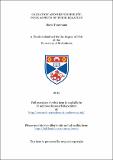Files in this item
Causation and responsibility : four aspects of their relation
Item metadata
| dc.contributor.advisor | Cruft, Rowan | |
| dc.contributor.advisor | Schaffer, Jonathan | |
| dc.contributor.advisor | Brown, Jessica (Jessica Anne) | |
| dc.contributor.author | Tarnovanu, Horia | |
| dc.coverage.spatial | ii, 180 p. | en_US |
| dc.date.accessioned | 2015-07-28T14:51:57Z | |
| dc.date.available | 2015-07-28T14:51:57Z | |
| dc.date.issued | 2015-06-25 | |
| dc.identifier | uk.bl.ethos.658889 | |
| dc.identifier.uri | https://hdl.handle.net/10023/7060 | |
| dc.description.abstract | The concept of causation is essential to ascribing moral and legal responsibility since the only way an agent can make a difference in the world is through her acts causing things to happen. Yet the extent and manner in which the complex features of causation bear on responsibility ascriptions remain unclear. I present an analysis of four aspects of causation which yields new insights into different properties of responsibility and offers increased plausibility to certain moral views. Chapter I examines the realist assumption that causation is an objective and mind-independent relation between space-time located relata – a postulate meant to provide moral assessment with a naturalistic basis and make moral properties continuous with a scientific view of the world. I argue that such a realist stance is problematic, and by extension so are the views seeking to tie responsibility attributions to an objective relation. Chapter II combines the context sensitivity of causal claims with the plausible idea that responsibility ascriptions rest on the assessment of causal sequences relating agents and consequences. I argue that taking context sensitivity seriously compels us to face a choice between moral contrastivism and a mild version of scepticism, viz. responsibility is not impossible, but ultimately difficult to identify with confidence. I show why the latter view is preferable. Chapter III explores the concern that group agents would causally (and morally) overdetermine the effects already caused by their constituent individuals. I argue that non-reductive views of agency and responsibility lack a coherent causal story about how group agents impact the world as relatively independent entities. I explain the practical importance of higher-order entities and suggest a fictionalist stance towards group agency talk. Chapter IV analyses the puzzle of effect selection – if causes have infinitely many effects, but only one or a few are mentioned in causal claims, what determines their selection from the complete set of consequents? I argue that the criteria governing the difference between effects and by-products lack clarity and stability. I use the concerns about appropriate effect selection to formulate an epistemic argument against consequentialism. | en_US |
| dc.language.iso | en | en_US |
| dc.publisher | University of St Andrews | |
| dc.subject | Causation | en_US |
| dc.subject | Responsibility | en_US |
| dc.subject | Causal realism | en_US |
| dc.subject | Causal contextualism | en_US |
| dc.subject | Causal selection | en_US |
| dc.subject | Group agency | en_US |
| dc.subject | Moral contextualism | en_US |
| dc.subject | Moral scepticism | en_US |
| dc.subject | Overdetermination | en_US |
| dc.subject | Fictionalism | en_US |
| dc.subject | Consequentialism | en_US |
| dc.subject.lcc | BD541.T2 | |
| dc.subject.lcsh | Causation | en_US |
| dc.subject.lcsh | Responsibility | en_US |
| dc.subject.lcsh | Consequentialism (Ethics) | en_US |
| dc.title | Causation and responsibility : four aspects of their relation | en_US |
| dc.type | Thesis | en_US |
| dc.type.qualificationlevel | Doctoral | en_US |
| dc.type.qualificationname | PhD Doctor of Philosophy | en_US |
| dc.publisher.institution | The University of St Andrews | en_US |
This item appears in the following Collection(s)
Items in the St Andrews Research Repository are protected by copyright, with all rights reserved, unless otherwise indicated.

